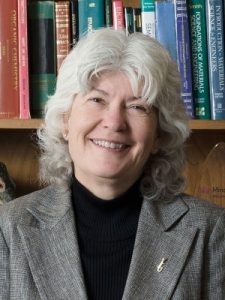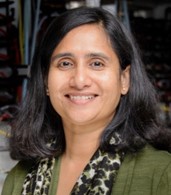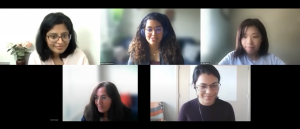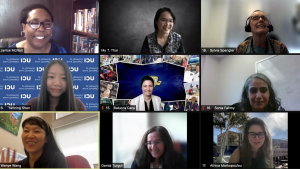The second annual Women in IoT (WIT) Workshop, “AI on the Edge,” was held virtually on Wednesday, Sept. 22, 2021. The women-led workshop was hosted by the Warren B. Nelms Institute for the Connected World and involved a team of organizers from multiple universities. The co-chairs of the workshop were Dr. Janise McNair, ECE, University of Florida; Dr. My T. Thai, CISE, University of Florida; and Dr. Damla Turgut, CS, University of Central Florida. The Panel Chair was Dr. Weyne Wang, ECE, North Carolina State University; and the Student Poster Chairs were Dr. Tempestt Neal CSE, University of South Florida; and Dr. Yanning Shen, EECS, University of California Irvine.

The free 4-hour workshop featured a keynote speaker, two panel discussions, a collaboration opportunities breakout session, and student poster sessions.

“The WIT2021 Workshop was a great success,” Dr. McNair said. “Our goal was to foster connection, collaboration, and enhanced research knowledge for female researchers in academia, industry, and government agencies. We had over 270 registered attendees from all over the world. As our workshop continues to grow and reach more researchers, we look forward to expanding our reach and impacting more women to grow their research in Internet of Things and the connected world.”
Dr. Cammy Abernathy, Dean of the Herbert Wertheim College of Engineering, delivered the opening remarks of the workshop. She noted how important diversity is in the field of engineering and the prominence of AI and IoT in the future of our society.

The keynote presentation was delivered by Dr. Sujata Banerjee, Senior Director of Research at VM Ware. In her talk “Towards Smart, Safe and Sustainable IoT Systems,” Dr. Banerjee discussed emerging trends and the societal needs fueling the increased use of IoT and AI, and highlighted the necessity of multidisciplinary interactions to solve these needs. She also talked about some of the challenges that need to be addressed for IoT Systems to be widely deployed, namely resource efficiency and safety. She finished her talk with a Q&A session, noting that there is still a long way to go solve these challenges.
Two panel discussions followed: Industry and Government Agency Leadership and University Research Leadership. Panelists discussed the future of IoT and AI, the collaboration between academia and industry, and their own personal experiences and their respective journeys to positions of engineering leadership.
The Industry and Government Agency Leadership panelists emphasized being proactive in seeking out scholarships and internships, and the importance of mentorship. When sharing her journey to Technical Advisor for U.S. Department of Energy Building Technologies Office, panelist Nikitha Radhakrishnan shared, “What I would do differently is to brag more. I was hardly confident, I used to never put forth my own skills- I still don’t at times. And if you don’t tell anyone what you’re good at, they won’t be able to give you the opportunity.”

The University Research panelists discussed the types of challenges facing the world of AI and IoT, the transition from student to other levels of academia and industry, and the importance of building connections. When talking about the start of her academic journey, panelist Sylvia Spengler, Program Director at the Division of Information and Intelligent Systems at National Science Foundation, emphasized seeking out new opportunities: “One of the mechanisms I used in addition to seminars was the more informal things. A couple interdisciplinary groups had informal luncheons and I basically got myself on those lists… [to learn] how to talk to people who weren’t my closest colleagues. And it enabled me to make connections that I never would have made otherwise.”

“Our keynote speaker and our panelists were some of the top women in research as well as top leaders in industry, university, and government agencies,” McNair said. “New this year were our collaboration sessions where we brought together attendees of similar research interests to build their network and foster new connections.”
The collaboration sessions included topics such as Junior Faculty Development, Industry and Academic Job Search, and Collaborative Research Projects. Participants broke out into groups based on their interests. The collaboration session was followed by a virtual student poster session. Graduate and undergraduate teams, all with female student researchers, were invited to submit an abstract on topics pertaining to AI and IoT. The authors of accepted abstracts presented their research posters live in individual poster sessions.
One of the workshop attendees said, “I thoroughly enjoyed and learned a lot from the WIT2021 conference. Even though virtual, I was amazed by how well coordinated and organized the conference was. Kudos to all the organizers!”
“In alignment with the University’s commitment to becoming a global force in AI, our workshop will significantly grow at the convergence of AI and IoT,” Dr. Thai said. “The workshop has been enriched through the participation of many outstanding female leaders and role models. We look forward to our future editions to addressing the gender gap issue in the field of AIoT, impacting more women on their career adventures.”
The full program and panelist information is available on the Nelms Institute Website, and the full workshop recording and student poster presentations can be viewed on YouTube.